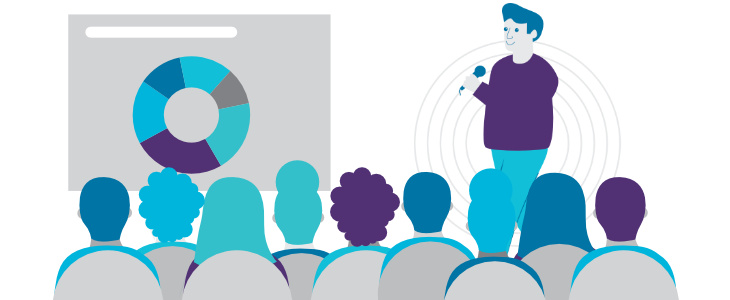So you got invited to speak at an event. Nice one. Well done you. Hat tip and pat on the back.
Please don’t mess it up though!
It’s great everyone is heading back to live events and they’re looking forward to hearing from thought leaders just like you.
But have you still got those skills? A few years of Zoom and Teams meetings may well have dulled the presenting skills. The comfort of your home office is different from the environment on a stage in front of hundreds of attendees.
Here are a few tips to get you up to speed for your next speaking engagement:
Don’t read your speech. Memorise it first.
Spend a few days memorising your speech in the days leading up to the event. Being prepared will make your speech seem more natural and engaging.
Delight the audience by ending it early!
You get your 15 minutes to shine so end it a couple of minutes early and make everyone’s day. This way you look prepared, reduce the risk of over-running, and give more opportunities for questions.
Be Interesting
People have turned up to your talk to hear someone interesting and vibrant who knows their subject matter well. They don’t want to hear someone stumbling over their words or speaking in a monotone. Switch things up. Tell a witty anecdote. A quick joke. Relate an interesting event that happened to you recently. Build a rapport with your audience so they’re switched on to you.
Avoid distracting your audience
Don’t remind people they’ve just had a big lunch and are tired. Don’t bring up the worst aspects of life in the world. All you’ll end up doing is reminding people of other things and distract them from your event. And whatever you do, use original material – jokes that get told by every speaker soon become tiresome.
Use Slides / Videos to make an impact
Use slides to add ooomph to your words but stick to graphs and pictures. The information comes from the words you say while the slide delivers the impact and backs up your point. Lumps of text on a screen are difficult to read from a distance and distract your attendees from listening to you.
Have One Simple Concept
Most people can’t remember what they had for breakfast yesterday let alone take in your five or ten big concepts. Make your talk memorable by hammering home the one simple concept you want everyone to take home. Mention it over and over again, and back it up with examples, testimonials and anecdotes. One simple idea will reduce distraction, focuses the mind, and lets everyone come away from your talk with a memory of what you were saying.
Know your fellow presenters
If you’re sharing the stage with other speakers try to have a pre-event meeting if you can, even if only to introduce yourself. It’s better to know a little bit about your fellow speakers and what questions each might answer so you don’t trip up over each other or forget their name and their discipline during your talk.
Be aware of industry trends
They’re likely to be what your guests are most interested in. They’ll be looking forward to your opinion on the latest technology or technique. Make sure your speech covers some of these points or have prepared answers to these questions.
Know the answers to likely questions
You know your topic inside out. Your guests don’t. They’re going to have questions. So, prepare by researching the most likely questions for your subject. Do a practice run-through of your speech with someone who isn’t aware of your subject matter and they can give you examples of likely feedback.
Be Active
Don’t hide on a chair. Entertainers don’t sit down, they’re active and work an audience. Move around and keep people’s eyes on you and their ears engaged with your words.
Avoid advertising yourself or your company
Believe it or not, people didn’t attend a seminar or conference to get sold to. They really don’t like overt selling. Too many speakers have nothing of interest to say and try to use the opportunity to sell their service, so stand out by being the person who delights them with deep knowledge of a subject.
There you go. Enact these tips and you’ll make everyone’s day a bit better the next time they come to hear you. Remember conferences, exhibitions, and events are an opportunity for most people to have a day or two out of the office. It’s your job to make that day more interesting and if you can’t do that at least make it not boring!

